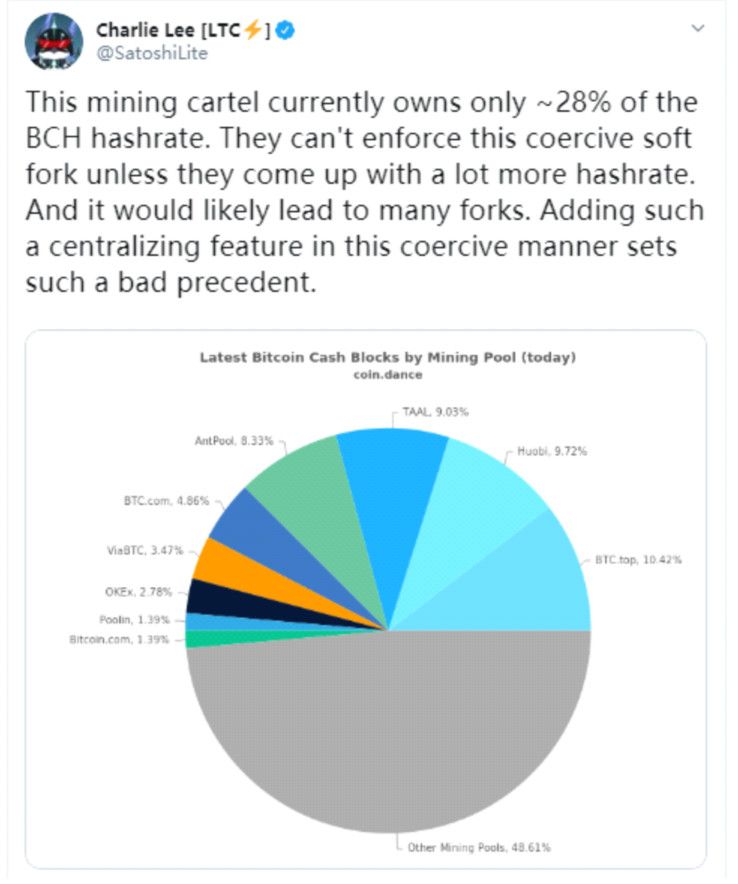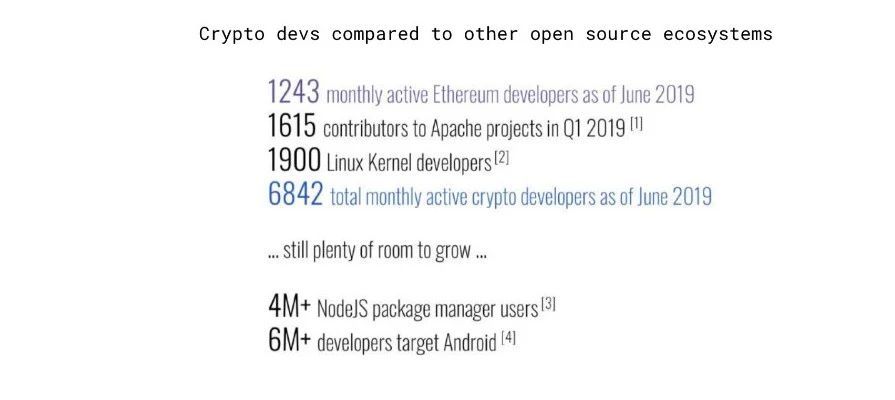Many mainstream project development funds are facing "burnout". Should BCH levy a miner tax?
Original: Five Fireball Leaders
Source: Vernacular Blockchain
Editor's Note: This article has been deleted without altering the author's original intention.
"A good tax officer should treat levy tax as a goose feather. The best way is to not only save the most goose feathers, but also to minimize the painful call of the goose." —— French Minister of Finance Jean Barr Thisster Colbert.
- Anchor Coin Watch: Can Bitcoin on Ethereum Break the DeFi Ceiling?
- Demystifying the IOTA mainnet suspension, bZx and SIM being hacked, doing so can improve account security
- Sue against FB, buy spaceship tickets with BTC, bitcoin career of billionaire "Gemini" brothers
Recently, to say the two most powerful things, the first must be Fcoin's bankruptcy (Or run) statement. Is it the second, I am afraid that it is BCH. The topic of miner tax has aroused heated discussions in the entire circle, and at the same time BCH has been pushed to the forefront. Many people who do n’t know the truth, have watched a lot of fun, but still in the fog, should the BCH miner tax be pumped?
01 event beginning and end
Before talking about this topic, let's first take a brief look at what actually happened?
1. Proposal : On January 22, Leibite Mining Pool Jiangzhuoer published a blog post announcing a "BCH Infrastructure Financing Plan" announcing that a proposal will be added to the BCH May upgrade, which will bring BCH in the future 6 12.5% of the monthly block reward was donated to the developer, and the domineering shouted "Uncooperative BCH mining pool, you alone!"
As for the reason why there is such confidence, it is because Wu Jihan, Yang Haibo and Bitcoin Jesus support this proposal. The mining pool power of these people has more than half of the BCH computing power.
2. Opposition : After the proposal is issued, it is inevitable that it will be opposed. Some miners leave a message on the chain saying "No !!", and some BCH developers have also expressed different opinions on the proposal. Many users in the BCH community have also expressed their opposition, especially for the "four people's decision-making" which has determined that such a big matter as BCH tax collection is strongly disturbed. What about good decentralization?
3. Status : BCH chief Amaury is extremely tough-"ABC has created more than $ 1 billion in revenue for miners. Is it a tax swell now? What's wrong ?! Isn't it justified ?!"
Roger V is vague-"For now, Bitcoin.com will not support any plans unless more consensus in the ecosystem makes the risk of chain forks negligible."
Jiang Zhuoer Songkou-"If there are too many people opposed to the miner donation model, you can start with the Nobel Prize model (an inspirational point proposed by Big V Lightning)."
02 Why Propose
The root cause is simple-developers have no money! You can't always let the cows work and not let the cows graze! Besides, BCH is not the first to make such a proposal.
At the BCH industry conference in Hong Kong in May 18, developers proposed to raise funds from mining pools to develop BCH projects, which caused great controversy. Some opponents called it a "dazzling donation incident." At that time, I was asked "If 75% of the computing power voted to agree to donate, but the remaining 25% of the computing power did not agree, what should I do? The solution given is similar to this time-" Most computing power compels a few computing power to obey " Of course, this proposal is left in the end.
In June last year, BCH organizations such as Bitcoinincash.org launched a total of 800 BCH (about 350,000 US dollars) fundraising. As a result, it was raised for half a month, and half of it was not raised, which was a bit awkward. Later, some BCH in various forums on the forum, finally raised almost the target value.
The reason for this proposal is that, in addition to estimating that the development team is facing an economic dilemma again, the more important problem is that large miners such as Jiang Zhuoer and Roger V want to find a long-term and stable support for BCH developers. The way. As we all know, BCH has been a community donation + part-time development model since its birth. It may be OK in the short term, but it is not a long-term plan to conduct this marathon with BTC. The sustainability and stability of the funding model are not high, and most of the developers are part-time, it is difficult to devote all their energy to development, which will affect the development progress and ecological process of BCH. Therefore, the lack of a long-term, stable income model that allows developers to develop with confidence and earn money is a thorn in the minds of these BCH biggest stakeholders for a long time. The "miner tax" can be regarded as One attempt, or "temptation", to see how loud the goose barked while plucking.
03 pros and cons
To say the pros and cons is actually a matter of opinion, and it is often the butt that determines the head. Supporters and opponents in BCH are often fighting for their own interests. Therefore, it may be useful to jump out of the BCH circle and look at other people. Industry leaders, what is the attitude towards this miner tax :
Wright Lee-Safety First
Li Qiwei thinks that although you are big brothers, the computing power is still not enough. BTC computing power comes to you? Isn't CSW still looking at it, he can shoot at any time! What's more, your decision is not centralized! The impact is not good!

"At present, the coal miner alliance only has about 28% of the computing power of the BCH network. Unless they call for more computing power, they cannot enforce this soft fork. And this may lead to many forks. Adding such a centralized feature will set a bad precedent. If this soft fork passes, it will be very unstable because there will be large BTC miners motivated to carry out 51% attacks. They can switch to BCH, and then mining 11 blocks in a row, and then they got all the BCH, which is at least 14% higher than the profit of mining BTC. "
V God-2020 so secretive? !!
V God expressed concern and opposition with a series of Twitter versions.

"I have to admit that strange things have happened even less than a month after what Mark Lutter called" weird 2020 "."
"12.5% of the overall reward for the BCH block was directed from miners to" a Hong Kong company. "The article labeled it as a voluntary form, but in fact, it was a mandatory soft fork."
"How does the claimed Hong Kong company ensure that this money is used for development?"
"I disagree with this idea of a market-for-consensus because it has a poor balance and can easily lead to entrenched interests."
04How Other Projects Solve the Problem
In fact, before you want to comment on the BCH incident, you can take a look at how several other projects have done it.
BTC -When Satoshi Nakamoto first invented BTC, like many inventions, he paid money, set up servers, wrote code, and tested … Of course, he also dug up millions of coins in silence, although these coins were at the time It's worth nothing.
After Satoshi Nakamoto retired, the decentralized nature of Bitcoin made the source of development funds always a problem. His successor Gavin Andresen had encountered financial problems. He had also initiated fundraising in the community at that time, and the results were not good. Then he turned to external help. Until later, with the involvement of external funds and forces, the problem was basically resolved. But again, the development direction of Bitcoin has fallen into the hands of the master gold BlockSteam behind the scenes, insisting not to expand, take the Lightning Network, the BCH split and a series of historical processes, which are provided with relatively centralized development funds, with more or less contact.
ETH & LTC – Ethereum has started to raise 12 million Ethereum, and has entered it into the Ethereum Foundation . It has been running relatively well so far. Due to the excessive increase in ETH, the Ethereum Foundation has been in a " Not bad money "status.
In contrast, LTC is a bit bleak. It also relies on the foundation to operate. Most of the time, Litecoin's founder Li Qiwei donated 80% of the total funds to the foundation. The Litecoin Foundation is often plagued by a shortage of development funds.
EOS & BSV -the underlying development of these two projects is relatively centralized, but the advantage is-really not bad money!
Through a one-year pre-sale, EOS earned more than 7 million ETH, and later realized most of it at a high level, with billions of US dollars in hand. There is really a willful way of hiring whoever you want, and whatever you want!
BSV, partner Calvin Ayre is a well-known billionaire in Australia, the development company behind it, not to mention, there are hundreds of blockchain patents in his hand, and the maintenance cost of the patent alone is said to have millions of dollars each year, so Developer salaries are something that belongs to A Pieace Of Cake.
Zcash – also has a developer fund , founded in 2016 with a well-known "founder reward", that is-20% of the block reward is obtained from miners and used to distribute to Zcash's founders and investors, Provided assistance for the sustainable development of the project, which will last for 4 years and will expire in November 2020.
But it is also this high proportion of "tax collection" or share that has kept Zcash under attack and has been slumped.
Even more frightening is that in a few months the founder rewards will be cancelled, and Zcash will also face the dilemma of having no money to continue research and development. Some time ago, Zcash passed an improvement proposal (ZIP1014) through governance, which was still drawn at 20%, but the distribution methods of the parties such as the ECC (Zcash Development Corporation) Foundation have changed, which basically belongs to changing the soup without changing the medicine. , Continue to collect taxes from miners to maintain the progress of project development.
The data shows that the influx of developers in the crypto ecosystem is stagnant, and the vast majority of developers are in the ecosystem of Bitcoin and Ethereum.

At present, there are about 7,000 active developers of cryptocurrencies per month. In contrast, NodeJS has more than 4 million developers and Android has 6 million developers. It can be said that the industry is still too weak for talent.
The development of the project, the role of developers in it should not be low, but the final gain is not the most. What do you think about this phenomenon? Welcome to the comments area to write your opinion.
——End——
"Disclaimer: This article is an independent opinion of the author, and does not represent the standpoint of the vernacular blockchain. This content is only for the popular science enthusiasts to learn and communicate. It does not constitute investment opinions or suggestions. Please take a rational view, establish a correct concept, and increase risk awareness. The copyright of the article and the right of final interpretation belong to the vernacular blockchain. A
We will continue to update Blocking; if you have any questions or suggestions, please contact us!
Was this article helpful?
93 out of 132 found this helpful
Related articles
- Front Running: The Achilles heel of decentralized trading
- 18 felonies and up to 20 years in prison! Former Microsoft employee convicted of digital currency scam
- What does De in DeFi mean and what does it mean for the blockchain industry?
- Bitcoin fell below $ 9,200, and the entire network was over $ 300 million in short positions. Is the halving quotation not over yet?
- Over 43% of Ethereum addresses are profitable, and researchers are optimistic that Ethereum will become a new hedge
- Comprehensive interpretation: What is the impact and value of the US SEC Commissioner's "Token Safe Harbor Proposal"?
- Why is FileCoin delayed again?




